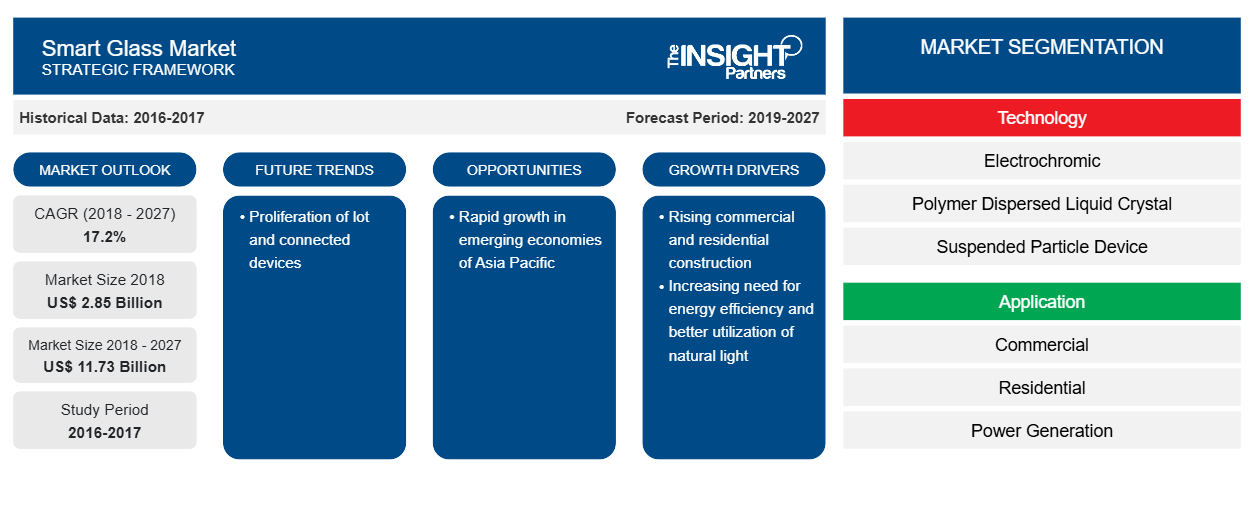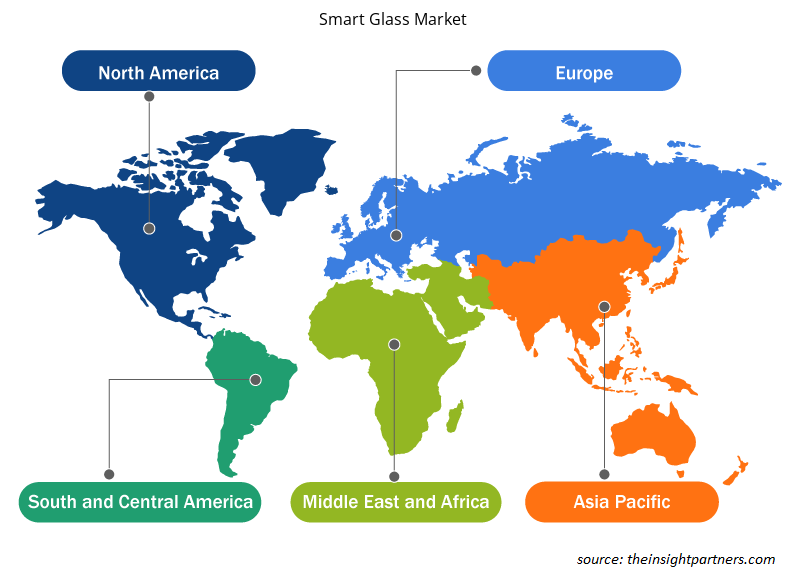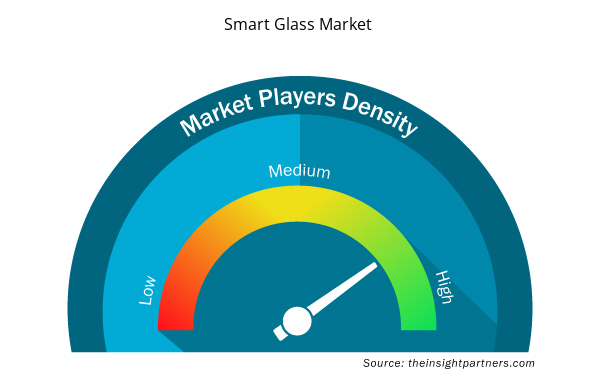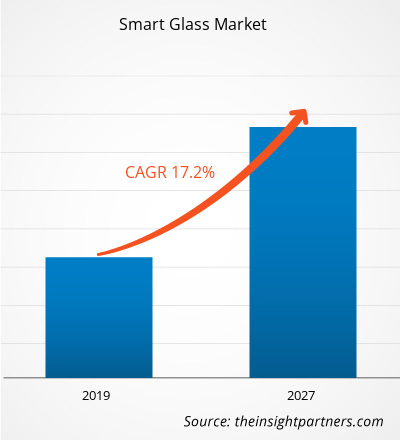[Research Report] The smart glass market was valued at US$ 2.85 billion in 2018 and is projected to reach US$ 11.73 billion by 2027; it is expected to grow at a CAGR of 17.2% during 2019–2027.
Analyst Perspective:
The smart glass market has recently experienced remarkable growth and technological advancement, with several key areas driving this evolution. Augmented reality (AR) and virtual reality (VR) smart glasses have gained significant traction, expanding their applications beyond entertainment and gaming to fields such as automotive, data analytics, and industrial smart manufacturing. AR smart glasses have become increasingly popular due to their ability to overlay digital information onto the user's real-world environment. This technology has found practical use in various industries, such as healthcare, construction, and logistics, where hands-free access to crucial data and visual guidance is essential. Additionally, the augmented and virtual reality smart glasses market has continuously grown, with manufacturers competing to deliver more immersive and intuitive experiences. Switchable and electrochromic glass technology has played a vital role in transforming the smart glass industry. By adjusting the tint or opacity of the glass, these innovative solutions offer increased privacy, energy efficiency, and enhanced user comfort in architectural applications. These advancements have particularly influenced the smart glass and smart window market, attracting attention from commercial and residential sectors seeking to incorporate smart glass technologies into their buildings. Moreover, the automotive smart glass market has significantly developed, with manufacturers integrating smart glass technologies into vehicles. This inclusion enhances the driving experience by providing heads-up displays (HUDs), augmented navigation, and real-time information, all contributing to improved safety and convenience for drivers. The demand for active smart glasses has also risen, catering to users who seek dynamically changing lenses or adjustable visual enhancements. These glasses have features like photochromic lenses, offering adaptive eyewear for various lighting conditions and user preferences. In industrial smart manufacturing, smart glasses have revolutionized how workers interact with machines and access information on the factory floor. The integration of artificial intelligence (AI) glasses has enabled real-time data analysis, improving productivity and efficiency while reducing errors. As the smart glasses market continues to evolve, more players are entering the smart glasses industry, offering innovative solutions and improved functionality. Top smart glass brands strive to provide the best smart glasses, incorporating cutting-edge technologies and seamless user experiences.
Market Overview:
Smart glass is a kind of architectural glass that alters how much light it can transmit in response to temperature, voltage, or light changes. These panes are frequently used for internal partitions, windows, and skylights in residential and commercial buildings. With smart eyewear, manual and automatic controls are both feasible. Technologies for smart glass include electrochromic, photochromic, thermochromic, suspended-particle, micro-blind, and polymer-dispersed liquid-crystal devices. Smart glass creates climate-adaptive building shells when integrated into the building envelope. Blinds, shades, and other window treatments may not be necessary with smart windows. In addition to controlling natural light, the smart glass may limit UV and infrared light, display advertisements, and offer security.
Customize This Report To Suit Your Requirement
You will get customization on any report - free of charge - including parts of this report, or country-level analysis, Excel Data pack, as well as avail great offers and discounts for start-ups & universities
Smart Glass Market: Strategic Insights

- Get Top Key Market Trends of this report.This FREE sample will include data analysis, ranging from market trends to estimates and forecasts.
Customize This Report To Suit Your Requirement
You will get customization on any report - free of charge - including parts of this report, or country-level analysis, Excel Data pack, as well as avail great offers and discounts for start-ups & universities
Smart Glass Market: Strategic Insights

- Get Top Key Market Trends of this report.This FREE sample will include data analysis, ranging from market trends to estimates and forecasts.
Market Driver:
Rise in Investment in Infrastructure Projects to Drive Growth of Smart Glass Market
The rise in investment in infrastructure projects has emerged as a crucial driver fueling the growth of the smart glass market. As governments and private sectors increasingly invest in modernizing and upgrading infrastructure, smart glass technologies are finding extensive applications in various projects, leading to a surge in demand for these innovative solutions. One area where smart glasses are making a significant impact is in the construction industry. Augmented reality (AR) smart glasses are utilized during the planning and construction phases to facilitate real-time collaboration, visualize building designs, and streamline stakeholder communication. These glasses enable on-site workers to access vital information, such as 3D models and instructions, without needing physical blueprints, resulting in increased productivity and reduced errors. Moreover, incorporating smart glass technologies in smart buildings has become a prominent trend. Switchable glass technology and electrochromic glasses are being integrated into energy-efficient buildings, optimizing natural lighting and regulating indoor temperature, leading to reduced energy consumption and enhanced occupant comfort. As sustainable building practices gain traction, the smart glass and smart window market is witnessing substantial growth, fueled by the demand for eco-friendly and energy-efficient solutions. The automotive smart glass market is also benefiting from increased infrastructure investments. As governments focus on developing smart cities and transportation systems, smart glasses are integral to advanced vehicles. Augmented reality (AR) HUDs and smart windows equipped with switchable glass technology are being adopted to improve automobile safety, navigation, and connectivity. Furthermore, the industrial smart manufacturing sector is leveraging smart glasses to enhance productivity and efficiency in infrastructure projects. Workers equipped with smart glasses can access real-time data, receive instructions, and troubleshoot issues instantly, reducing downtime and optimizing production processes. As infrastructure projects incorporate smart manufacturing practices, the demand for active smart glasses and AI-driven solutions is expected to grow. The growing investment in infrastructure projects acts as a catalyst for market growth in the smart glass industry. As more projects integrate smart glass technologies to enhance productivity, safety, and sustainability, the demand for AR and VR smart glasses, switchable glass, and other high-technology glass solutions will continue to rise. The convergence of infrastructure development and smart glass applications opens up lucrative opportunities for manufacturers and drives innovation in the smart glasses market.
Segmental Analysis:
Based on technology, the smart glass market is segmented into:
- Electrochromic
- Polymer Dispersed Liquid Crystal (PDLC)
- Suspended Particle Device (SPD)
- Thermochromic
- Photochromic
- Others
The suspended particle device (SPD) segment held the largest share of the market in 2018 and is anticipated to register the highest CAGR in the market during the forecast period. The suspended particle device (SPD) segment has emerged as the dominant player, holding the largest share in the smart glass market. SPD technology, also known as switchable glass technology, offers significant advantages, such as instant transition between transparent and tinted states, enabling dynamic control over light transmission and privacy. This versatility has garnered immense interest in both architectural and automotive applications. In the architectural sector, SPD smart glass is sought after for its ability to enhance energy efficiency, regulate indoor temperatures, and create interactive and visually appealing environments. Similarly, SPD smart glass is integrated into sunroofs, windows, and sun visors in the automotive industry, providing drivers and passengers with customizable shading options, advanced glare reduction, and improved comfort. As infrastructure investments rise, driving demand for smart glass technologies, the SPD segment is poised to maintain its leadership position, contributing significantly to the overall market growth.
Regional Analysis:
The North America smart glass market was valued at US$ 10,433.33 billion in 2018 and is projected to reach US$ 15,386.11 billion by 2027; it is expected to grow at a CAGR of 5.1% during the forecast period. The smart glass market in North America has asserted its dominance, exhibiting robust growth and commanding the largest share of the industry. Several key factors have contributed to the region's market leadership. North America has been at the forefront of AR and VR technology development, with numerous companies and startups pioneering innovative applications for smart glasses in healthcare, education, and entertainment. This early adoption has created a strong foundation for the growth of the region's AR and VR smart glasses market. Additionally, North America's infrastructure investments have fueled the demand for smart glass technologies, particularly in the architectural sector. Implementing switchable glass technology, such as suspended particle device (SPD) smart glass, has gained popularity in the region due to its energy-efficient and sustainable features. As smart buildings and green initiatives become a priority, North American markets have witnessed a surge in demand for smart windows and glass solutions that regulate light and temperature, reducing energy consumption and enhancing occupant comfort. The automotive smart glass market has also flourished in North America, driven by the region's advanced automotive industry and the integration of smart technologies in vehicles. Adopting smart glasses, including switchable glass solutions, for sunroofs, windows, and heads-up displays (HUDs) has enhanced the driving experience, contributing to increased safety and convenience on the roads. Furthermore, leading smart glass technology companies and manufacturers in North America have played a pivotal role in the market's dominance. These companies have invested heavily in research and development, driving innovation and bringing cutting-edge smart glass products. Government support for smart infrastructure projects and sustainable building initiatives has further bolstered the smart glass market in North America. Policymakers have recognized the potential benefits of smart glass technologies in terms of energy efficiency, environmental conservation, and enhanced urban living, leading to favorable regulations and incentives that spur market growth.
Key Player Analysis:
The smart glass market analysis consists of the players such as AGC, INC., ArtRatio S.L., Compagnie de Saint-Gobain S.A., Corning Incorporated, GENTEX Corporation, Hitachi Chemical Co., Ltd., Pleotint LLC, Polytronix, Inc., Research Frontiers Incorporated, and Smartglass International Limited. Among the players in the smart glass GENTEX Corporation and Corning Incorporated are the top two players owing to the diversified product portfolio offered.
Smart Glass Market Regional Insights
The regional trends and factors influencing the Smart Glass Market throughout the forecast period have been thoroughly explained by the analysts at Insight Partners. This section also discusses Smart Glass Market segments and geography across North America, Europe, Asia Pacific, Middle East and Africa, and South and Central America.

- Get the Regional Specific Data for Smart Glass Market
Smart Glass Market Report Scope
| Report Attribute | Details |
|---|---|
| Market size in 2018 | US$ 2.85 Billion |
| Market Size by 2027 | US$ 11.73 Billion |
| Global CAGR (2018 - 2027) | 17.2% |
| Historical Data | 2016-2017 |
| Forecast period | 2019-2027 |
| Segments Covered |
By Technology
|
| Regions and Countries Covered | North America
|
| Market leaders and key company profiles |
Smart Glass Market Players Density: Understanding Its Impact on Business Dynamics
The Smart Glass Market market is growing rapidly, driven by increasing end-user demand due to factors such as evolving consumer preferences, technological advancements, and greater awareness of the product's benefits. As demand rises, businesses are expanding their offerings, innovating to meet consumer needs, and capitalizing on emerging trends, which further fuels market growth.
Market players density refers to the distribution of firms or companies operating within a particular market or industry. It indicates how many competitors (market players) are present in a given market space relative to its size or total market value.
Major Companies operating in the Smart Glass Market are:
- AGC, INC.
- ArtRatio S.L.
- Compagnie de Saint-Gobain S.A.
- Corning Incorporated
- GENTEX Corporation
Disclaimer: The companies listed above are not ranked in any particular order.

- Get the Smart Glass Market top key players overview
Recent Developments:
Inorganic and organic strategies such as mergers and acquisitions are highly adopted by companies in the smart glass market. A few recent key market developments are listed below:
- In February 2022, Guardian Glass introduced ClimaGuard Neutral 1.0, developed to meet the new Part L UK Building Regulations for windows in new and existing residential builds. Guardian ClimaGuard Neutral 1.0, a thermal insulating coated glass for double-glazed windows, has an Ug-value of 1.0 W/m2K and offers improved aesthetics with a more neutral color and a lower reflection than other 1.0 U-value glass products for residential windows.
- In July 2021, Viracon, a single-source architectural glass fabricator, introduced Viracon PLUS Smart Glass powered by Halio, a breakthrough self-tinting smart glass solution that incorporates Halio, Inc.'s proprietary electrochromic technology into Viracon's insulated glass units. Viracon PLUS Smart Glass powered by Halio optimizes occupant comfort by autonomously adjusting tint levels to reduce energy consumption while natural light is maximized.
- Historical Analysis (2 Years), Base Year, Forecast (7 Years) with CAGR
- PEST and SWOT Analysis
- Market Size Value / Volume - Global, Regional, Country
- Industry and Competitive Landscape
- Excel Dataset



Report Coverage
Revenue forecast, Company Analysis, Industry landscape, Growth factors, and Trends

Segment Covered
Technology ; Application

Regional Scope
North America, Europe, Asia Pacific, Middle East & Africa, South & Central America

Country Scope
US, Canada, Mexico, UK, Germany, Spain, Italy, France, India, China, Japan, South Korea, Australia, UAE, Saudi Arabia, South Africa, Brazil, Argentina
Trends and growth analysis reports related to Electronics and Semiconductor : READ MORE..
The List of Companies - Smart Glass Market
- AGC, INC.
- ArtRatio S.L.
- Compagnie de Saint-Gobain S.A.
- Corning Incorporated
- GENTEX Corporation
- Hitachi Chemical Co., Ltd.
- Pleotint LLC
- Polytronix, Inc.
- Research Frontiers Incorporated
- Smartglass International Limited

 Get Free Sample For
Get Free Sample For